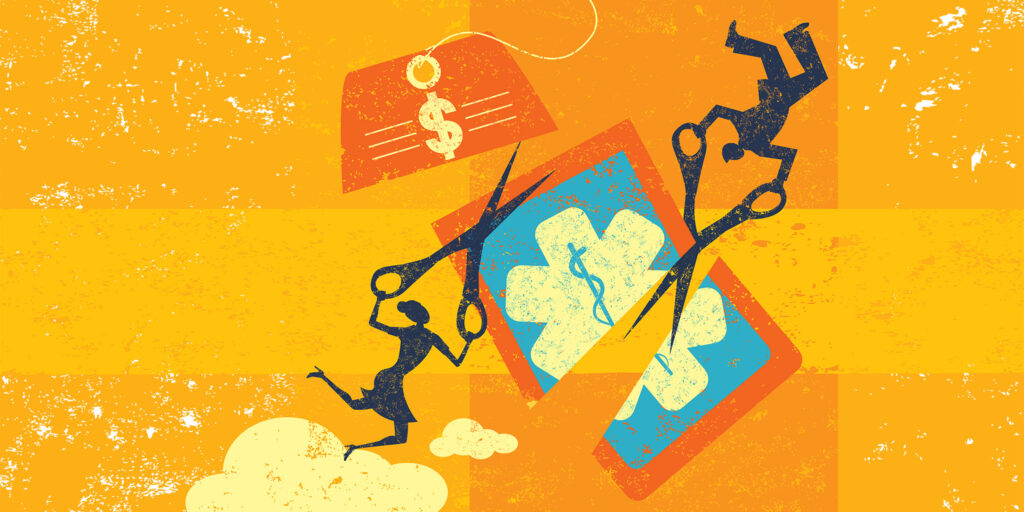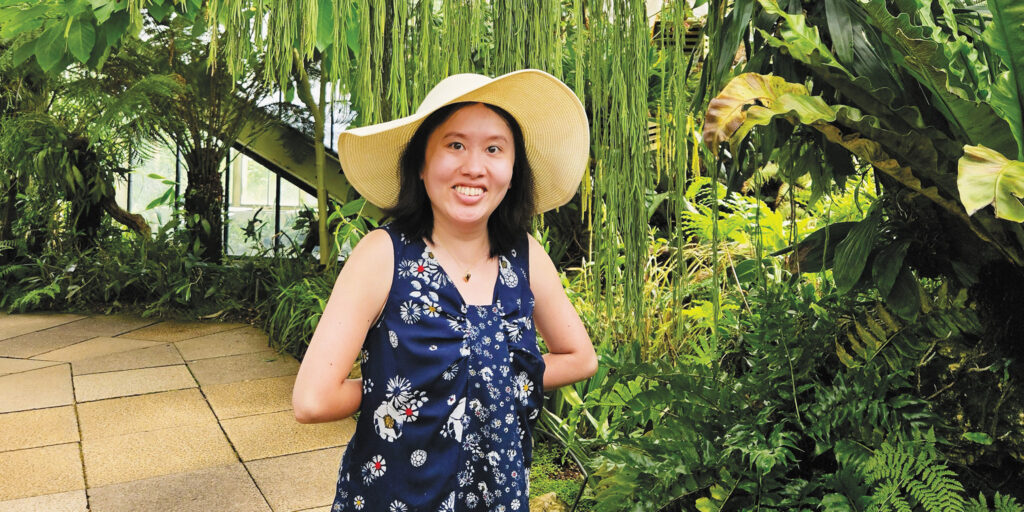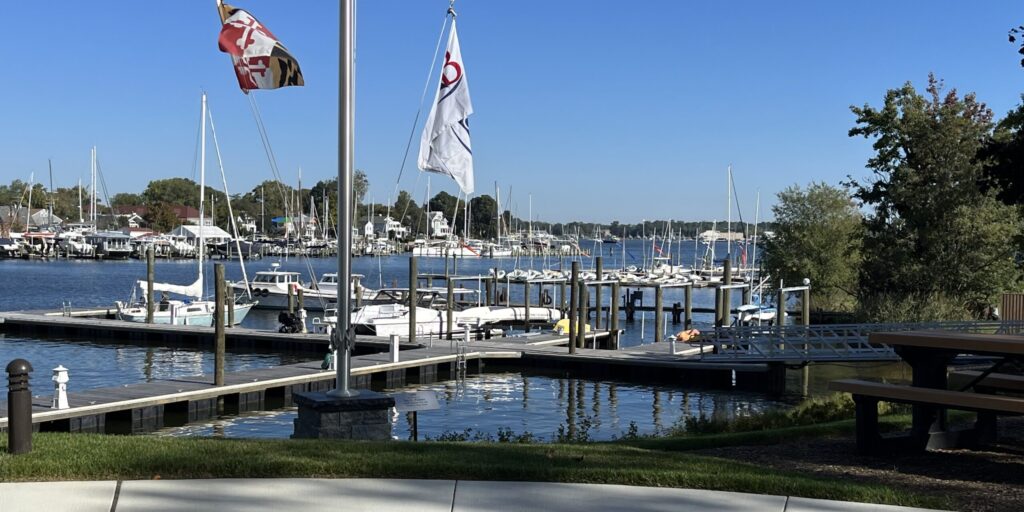
MDA Ambassador Guest Blog: The Joy of Accessible Sailing
By Mike Huddleston | Tuesday, July 15, 2025
5 Second Summary
MDA Ambassadors play an essential role in furthering MDA’s mission while representing and empowering the neuromuscular disease community. Quest Ambassador Guest Blog series provides a platform to share their personal stories, perspectives, and experience.
Mike Huddleston is 62 years old. He is originally from California and now lives in Maryland. Mike was diagnosed with spinal muscular atrophy (SMA) Type 3 at the age of 16. He started using a power wheelchair in 2015. He and his wife of over 40 years, Debbie, are both retired. Mike volunteers with several organizations serving the disability community and enjoys exercising, reading, watching movies and documentaries, listening to music, studying astronomy, and collecting vintage skateboards. In 2018, Mike was one of the first five adult SMA patients in Maryland to begin Spinraza treatment and currently takes Evrysdi. In addition to organizations such as CRAB, Mike is also thankful for the current and upcoming SMA treatment options and appreciates the dedication of so many researchers, scientists, doctors, and support staff, all of whom are committed to improving the lives of those of us in the disability community.
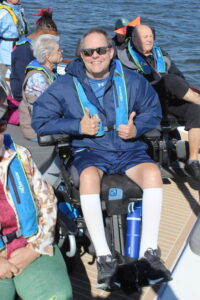
Mike Huddleston on a larger sail through CRAB with an organization called The Impossible Dream. They are from Miami and were visiting CRAB and invited some of us to go out on their quite large catamaran.
Safe and accessible recreation is so important for members of our community, Getting involved with accessible sports and recreational activities provides opportunities for new and enhanced friendships, family bonding, improved physical and mental health, a sense of well-being, building confidence, and may help foster a sense of community and belonging. As a member of the disability community, I encourage you to explore the wide array of amazing accessible recreational opportunities that are available to you.
I firmly believe in the physical, emotional, and mental benefits of accessible recreation and adaptive sports.
For me, sailing or just being near the water provides a sense of serenity, calming frayed nerves, as well as providing a feeling of belonging. Sharing this experience with others helps me feel more connected to those in our community and brings me closer to nature. After sailing, I feel refreshed and peaceful, and always filled with anticipation looking forward to my next adventure on or near the water. As a power wheelchair user, I have had amazing experiences sailing with Chesapeake Region Accessible Boating (CRAB), the country’s premier accessible sailing facility, in Annapolis, Maryland.
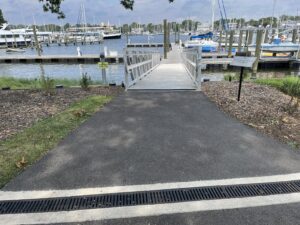
Accessible Ramp at Chesapeake Region Accessible Boating (CRAB), the country’s premier accessible sailing facility, in Annapolis, Maryland.
In addition to sailing with CRAB myself, I also often volunteer as a guest liaison welcoming guests to their accessible sailing adventure. I greet the guests as they arrive, make sure their water bottles are full, that they are properly attired for the weather, and help with their personal flotation devices (PFDs). The guests are assigned to one of six accessible 22-foot Beneteau First 22As sailboats and its designated skipper and crew member. The guests are escorted, one assigned boat at a time, by the skipper and crew members down the gently sloped gangway to the 80-foot T head floating dock.
Depending on the needs of each guest, CRAB staff and volunteers provide assistance to help guests board the sailboat. This may include the use of a hydraulic lift (similar to a Hoyer lift) or a transfer box with a slide. The safety of each guest is paramount, and all staff and volunteers are trained in these processes. Each sailboat is designed for sailors with physical disabilities and features two accessible chairs mounted directly to the cockpit that provide safety and security throughout the sail. In addition to serving guests with various disabilities, caregivers and family members are also allowed and encouraged to sail, making this a rewarding experience for all. Each sailing outing lasts about two hours, and all guests are encouraged to participate in actual sailing-related activities.
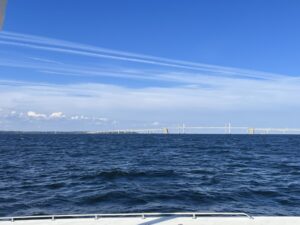
Mike Huddleston’s view from a catamaran
In addition to sailing, CRAB also provides several other accessible activities. These include adaptive fishing or cruising outings on their Gemini power catamaran, aptly named ‘Dream Catcher’, which provides access to the water for guests who prefer not to leave their wheelchairs. They also offer completely accessible adaptive programs for artwork, musical programs and benefit concerts, photography, and exercise classes such as yoga on their property or in their Adaptive Boating Center (ABC), which meets and often exceeds all ADA compliance standards. The views from the property or ABC overlooking Back Creek and their marina provide a calming and peaceful atmosphere for all of their offered activities and programs, which are offered free of charge to guests and are supported by generous donations, sponsorships, and partnerships.
In addition to CRAB, there are many other types of accessible and adaptive forms of recreation and sports offered locally to members of our community here in Maryland, as well as all around the country. A quick Internet search for “adaptive sports” or “adaptive recreation” will provide you with a wide range of activities in your area or even nationally.
- If you’re interested in accessing CRAB’s free and accessible activities, please visit CRAB’s website for more information: Chesapeake Region Accessible Boating – Therapeutic Sailing.
- Read more about adaptive sports in A Guide to Getting Involved in Adaptive Sports
- Check out other adaptive sports resources, like the Challenged Athletes Foundation, which under their resources menu has a list of adaptive organizations by state, and Move United, which shares activities by type and location.
Next Steps and Useful Resources
- For more information about the signs and symptoms of Spinal muscular atrophy (SMA), as well an overview of diagnosis and treatment concerns, an in-depth review can be found here.
- If you’re interested in accessing CRAB’s free and accessible activities, please visit CRAB’s website for more information: Chesapeake Region Accessible Boating – Therapeutic Sailing.
- Read more about adaptive sports in A Guide to Getting Involved in Adaptive Sports
- Check out other adaptive sports resources, like the Challenged Athletes Foundation, which under their resources menu has a list of adaptive organizations by state, and Move United, which shares activities by type and location.
- MDA’s Resource Center provides support, guidance, and resources for patients and families. Contact the MDA Resource Center at 1-833-ASK-MDA1 or ResourceCenter@mdausa.org
- Stay up-to-date on Quest content! Subscribe to Quest Magazine and Newsletter.
Disclaimer: No content on this site should ever be used as a substitute for direct medical advice from your doctor or other qualified clinician.



